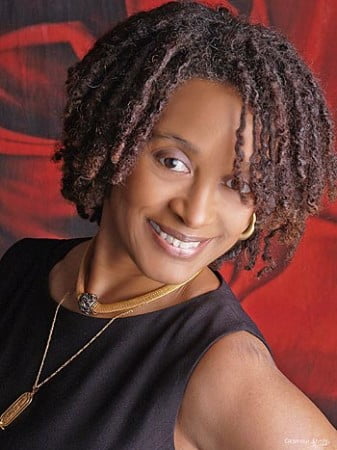On Happiness and Change

by Meta Commerse
We Americans expect happiness. Our nation’s founding documents make it our birthright.
Our religious education promises happiness as both the present and future reward for godliness. Education, the road to success, is synonymous with happiness, so we’ve been told.
Still, our definition of happiness changes with our rapidly changing culture. In childhood, I learned that getting what I wanted, especially if it was just an item and not an event, got me only fleeting happiness. “You can’t build your happiness on the unhappiness of others.” This old adage suggests that happiness needs good roots to be healthy or sustainable, and thickens the plot.
During my recent Atlanta visit, I stopped at my favorite health foods store. Inside I noticed that, without exception, every store clerk working the aisles, behind the counters, at the check-out lanes, was African American. Right away, my body relaxed, as if tensed so long and finally exhaling. For it’s true, there’s no such scenario in Asheville.
In the autumn of my life I moved to Asheville expecting happiness, expecting to partake in an exciting, metaphysical social phenomenon. I had heard the Asheville hype, how beautiful it is, about the surrounding healing vortices, how a band of hippies had retired here.
Soon, like a dream, I found myself swept into Asheville’s genuinely friendly, conscious Bohemian community, where probing conversations about race, class, gender, and religion are commonplace. I hadn’t ever been part of so many honest, heartfelt conversations outside of school! However, morning quickly broke. The more familiar I became with regional WNC traditions and politics, the more I got involved, the clearer the mud. What now?
Phil Donohue used a signature question to flesh out conundrums of power: “Who shall decide?” In the outmoded, autocratic business organization model, only “The Boss” decided and announced His decisions. Although we rightfully call that “tyranny” today, we are grateful for jobs to go to. So, we keep our mouths shut and govern ourselves accordingly. End of story.
Living here has taught me to banish certain overused, coded terms from my vocabulary, relative terms such as “progressive,” “liberal,” and “conservative.” Compared to what? We fool no one with that Jim Crow measuring stick.
My mere, sometimes token-like presence asks, “What’s relative about equality?” Either we’re working for it, or we aren’t. Anything less than our best leaves us complicit with the old ways—keeping the stale bathwater yet pretending to bathe clean. Young people call it “perpetrating” (Now that’s a term I’ll keep!).
Either we have a mandate, an uncompromising, inclusive, and just agenda, or we don’t. Either we use our power on behalf of the whole community, or we still bless and protect the haves and their having at the expense of the have-nots. In that case, the whole bushel spoils while our “progressive” laws expire!
This juxtaposition of Asheville’s cool image with its strange exclusionary tradition is felt by all, and explained by none. How do we stand for change when called upon? Do we give change a cautious, dense, and benign lip service, thinking this enough, appropriate, and authentic?
Until August 5, I sat truly bothered by this question. At the Moral Monday rally, Rev. Dr. William Barber, President of the NAACP North Carolina chapter, proclaimed, “We have a movement!” He called us “one people” united around a cause and described the movement’s historic context as going back to the 1860s, then declaring that “only the Lord could make us one” in this way.
There, I saw all kinds of people. I noticed that exciting, metaphysical social phenomenon, and it caused me momentary release of my own hard-won, historic armament and sense of righteous injury in exchange for a better development. Something so long in the making and so surprisingly powerful—it eluded my vigilance.
Its potential in the air, its stunning fever pitch palpable, suddenly I could imagine that the oneness Dr. King and others gave their lives for, the oneness he described in his Dream, might actually be real in our lifetime.
Did Rev. Barber ignite a synergy necessary for action?
“You can’t build your happiness on the unhappiness of others,” is an adage for everybody on the wealth pyramid. It applies directly to the one percent, to corporations using legislation to protect their profits at the people’s expense. It applies to the distinguished middle class, perhaps now aware of the true origins of their fortune.
Wise light for all, it also applies indirectly to the African American community, to people of color, to the working poor, and the outcast, upon whose ancestors’ backs our nation was built, maintained, and prospered.
With this quest, this social phenomenon, and our newfound movement, perhaps we will redefine happiness and even our city.
Meta Commerse, M.A., M.F.A. is Director of Story Medicine of Asheville, a unique healing program. She is also an author, activist, and public speaker. Meta is also a professor of English and History at Haywood Community College. Her novel, The Mending Time, is forthcoming. Meta is available to speak to your group on the healing power of story and other topics of interest. Contact her on Facebook.
.






Well said Meta, and thank you again for shining a spot light on the hidden problems of today. Unfortunately the birthright to happiness our founding documents suggested, didn`t include everyone. Our happiness (non-whites) was not taken into consideration while slave owners penned them. We are being told to be happy for the recent inclusion, and don`t make waves about the obstacles that are ever present. We will not be happy until those who are happy cease to be happy with the status quo, and demand happiness for all.